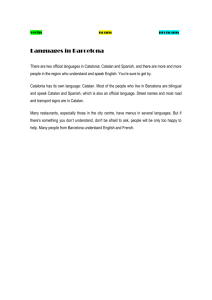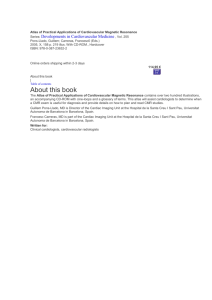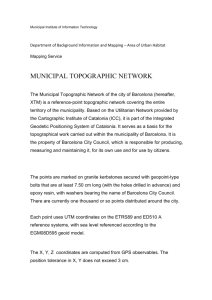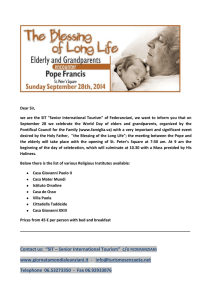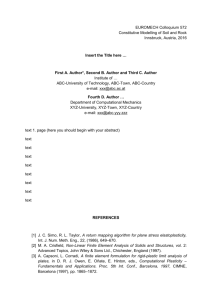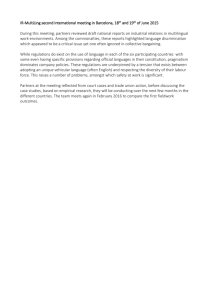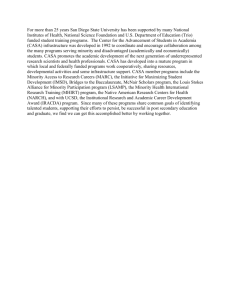SEMINAR ON GOVERNANCE IN CENTRAL ASIA
advertisement
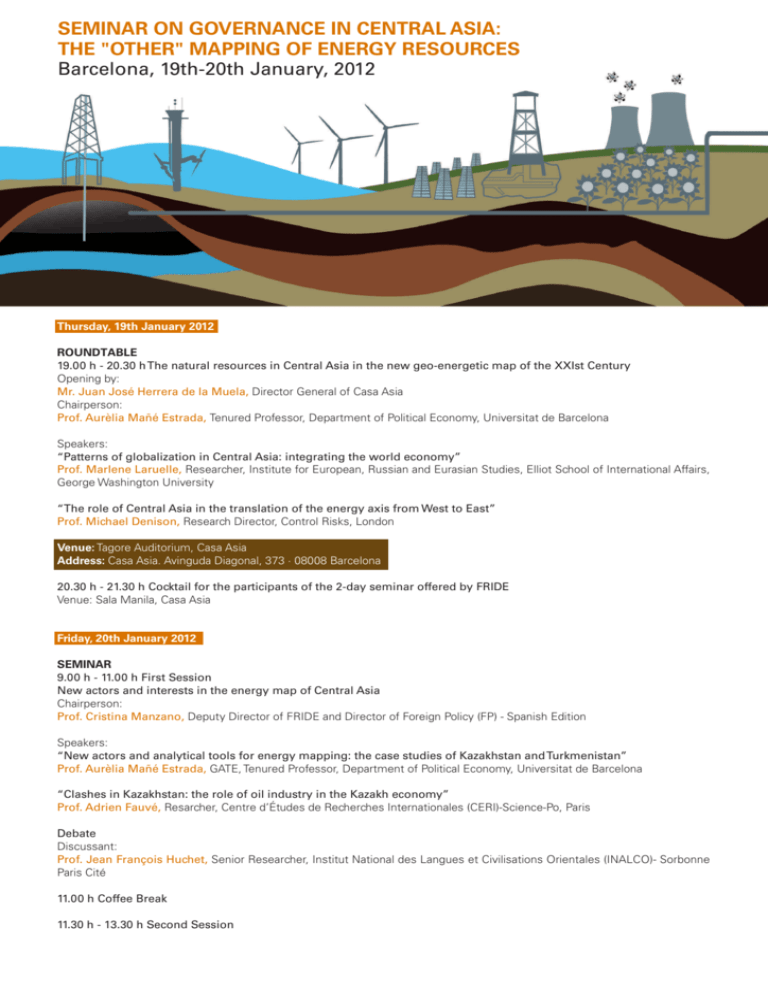
SEMINAR ON GOVERNANCE IN CENTRAL ASIA: THE "OTHER" MAPPING OF ENERGY RESOURCES Barcelona, 19th-20th January, 2012 Thursday, 19th January 2012 ROUNDTABLE 19.00 h - 20.30 h The natural resources in Central Asia in the new geo-energetic map of the XXIst Century Opening by: Mr. Juan José Herrera de la Muela, Director General of Casa Asia Chairperson: Prof. Aurèlia Mañé Estrada, Tenured Professor, Department of Political Economy, Universitat de Barcelona Speakers: “Patterns of globalization in Central Asia: integrating the world economy” Prof. Marlene Laruelle, Researcher, Institute for European, Russian and Eurasian Studies, Elliot School of International Affairs, George Washington University “The role of Central Asia in the translation of the energy axis from West to East” Prof. Michael Denison, Research Director, Control Risks, London Venue: Tagore Auditorium, Casa Asia Address: Casa Asia. Avinguda Diagonal, 373 · 08008 Barcelona 20.30 h - 21.30 h Cocktail for the participants of the 2-day seminar offered by FRIDE Venue: Sala Manila, Casa Asia Friday, 20th January 2012 SEMINAR 9.00 h - 11.00 h First Session New actors and interests in the energy map of Central Asia Chairperson: Prof. Cristina Manzano, Deputy Director of FRIDE and Director of Foreign Policy (FP) - Spanish Edition Speakers: “New actors and analytical tools for energy mapping: the case studies of Kazakhstan and Turkmenistan” Prof. Aurèlia Mañé Estrada, GATE, Tenured Professor, Department of Political Economy, Universitat de Barcelona “Clashes in Kazakhstan: the role of oil industry in the Kazakh economy” Prof. Adrien Fauvé, Resarcher, Centre d’Études de Recherches Internationales (CERI)-Science-Po, Paris Debate Discussant: Prof. Jean François Huchet, Senior Researcher, Institut National des Langues et Civilisations Orientales (INALCO)- Sorbonne Paris Cité 11.00 h Coffee Break 11.30 h - 13.30 h Second Session SEMINAR ON GOVERNANCE IN CENTRAL ASIA: THE "OTHER" MAPPING OF ENERGY RESOURCES Elements for a new regional cooperation structure Chairperson: Prof. Tica Font, Director, Institut Català Internacional per la Pau (ICIP) Speakers: “Building a regional framework in Central Asia: between cooperation and conflict” Prof. Mar Campins Eritja, Tenured Professor, Department of International Law and Economy, Universitat de Barcelona “Regional structures in Central Asia. Competition and Cooperation among external actors” Prof. Sebastien Peyrouse, Senior Researcher, Central Asia and Caucasus Institute & Silk Road Studies Program, Johns Hopkins University Debate Prof. Pablo Pareja, Assistant Professor, Department of Public International Law and International Relations, Universitat Pompeu Fabra To be determined 13.30 h - 13.45 h Closure of the seminar by Prof. Enoch Albertí, Dean of the Faculty of Law, Universitat de Barcelona Venue: Room Seminari 1, Facultat de Dret Address: Universitat de Barcelona. Avinguda Diagonal, 684 · 08034 Barcelona Coordinated by: Mar Campins Eritja, Universitat de Barcelona Aurèlia Mañé Estrada, Universitat de Barcelona Eva Soms Bach, Casa Àsia Organised by: In collaboration with: In the Framework of: * YEARS www.asiacentral.es * This programme has benefited from the support for the implementation of complementary actions, subprogramme of complementary actions. Call 2011 (reference: DER2011-14 608-E-subJURI). www.casaasia.cat · www.casaasia.es · www.casaasia.eu Consorci Casa Àsia / Consorcio Casa Asia: Alt Patronat / Alto Patronato: UNIVERSITAT DE BARCELONA (UB www.ub.edu The UB is one of the largest public universities in Spain. The organizational structure of the UB is based around the 20 Faculties and Schools, more than 100 Departments and several Research Institutes. It offers 65 bachelor's degrees, 152 university master's degrees, 71 PhD programmes and more than 400 programmes on continuous education. It is also Spain’s leading centre for research in terms of both the number of research programmes, scientific production and degrees of excellence attained. The UB currently has two Campuses of International Excellence recognized by the Spanish Ministry of Education: the Barcelona Knowledge Campus (BKC) and the Universitat de Barcelona Health Campus (HUBc). A group of UB’s professors from the School of Law and the School of Economics have been promoting for several years the studies on Central Asia issues. Particularly, the group is developing an analytical conceptual framework in order to assess the threats that environmental and energetic challenges in the countries of Central Asia pose to international security, both from an economic and legal perspective. Is in such a context that the actual seminar takes place in Barcelona, which aim is to consolidate the core of an international research network on energy and environmental governance in Central Asia. CASA ASIA www.casaasia.es Casa Asia is a public consortium formed by the Ministry of Foreign Affairs and Cooperation of Spain, the Catalan Regional Government, the City Hall of Barcelona and the City hall of Madrid. Casa Asia was created in 2001 with the will to strengthen the knowledge and dialogue about Asia in Spain, with the analysis and discussion of civic, political, social, cultural, economic and environmental issues, supporting activities and projects that contribute to a better knowledge between Asian and Spanish societies, and to promote the development of relations among them. YEARS CENTRAL ASIA OBSERVATORY www.asiacentral.es www.asiacentral.es The Central Asia Observatory (CAO) is a platform to enhance the knowledge on Central Asian countries in Spanish speaking countries. CAO was created in 2008 by Casa Asia with the collaboration of the two Spanish think tanks CIDOB and Royal Institute Elcano and works in collaboration with national and international centres, experts and companies in the field of public diplomacy in order to increase the relations between Spain and Central Asian countries. INSTITUT CATALÀ INTERNACIONAL PER LA PAU (ICIP) www.gencat.cat/icip Created in 2007 by the Catalan Regional Government, and operational since 2009, the aim of ICIP (International Catalan Institute for Peace) is to promote a culture of peace throughout the world, to endorse peaceful solutions and conflict resolutions and to endow Catalonia with an active role as an agent of peace. ICIP is governed by principles that promote peace, democracy, justice, equality and equity in relationships between individuals, peoples, cultures, nations and states. Its aim is to work for human security, disarmament, the prevention and peaceful resolution of conflicts and social tensions, and to strengthen the roots of peace and coexistence, peace building and advocacy of human rights. Its main audience is civil society, the peace movement, universities and the academic world in general, the Catalan Parliament, and the Catalan Regional Government. FRIDE www.fride.org FRIDE is a European think tank for global action, which provides innovative thinking and rigorous analysis of key debates in international relations. Our mission is to inform policy and practice in order to ensure that the EU plays a more effective role in supporting multilateralism, democratic values, security and sustainable development. FRIDE benefits from political independence and the diversity of views and intellectual background of its international team. Based in Madrid, FRIDE seeks to enhance the southern European perspective within EU debates and the European perspective within Spain. Our main contribution to international debates stems from our empirical research on the development and promotion of democracy, the increasing role of emerging powers, the role of international development cooperation in advancing universal values, global governance and multilateralism, the complexity of threats to peace and security and fragile states and energy security.
